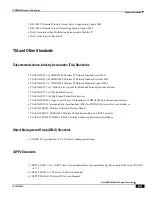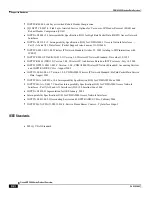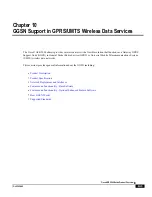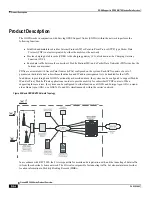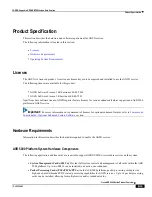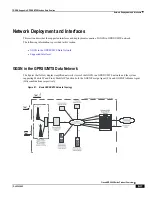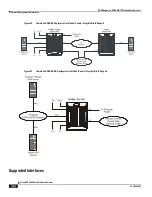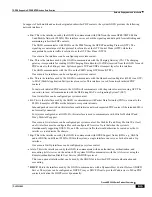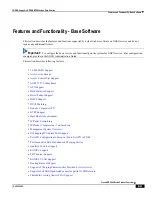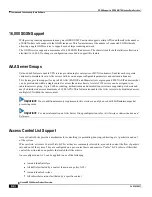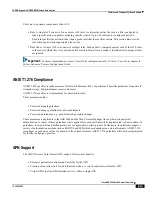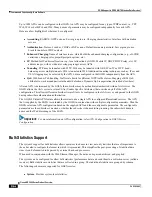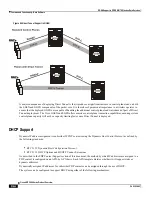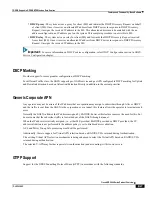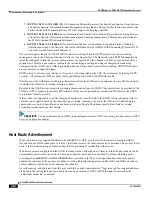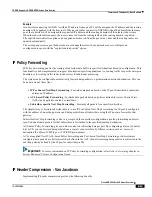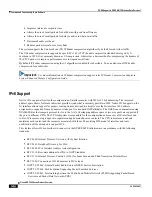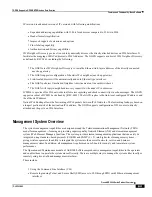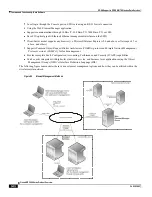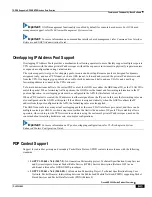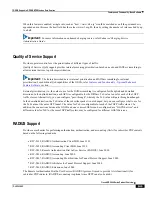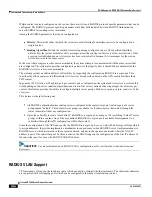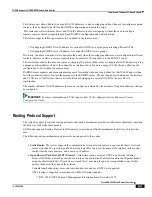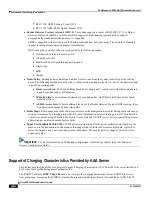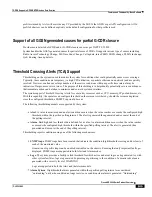
GGSN Support in GPRS/UMTS Wireless Data Services
Features and Functionality - Base Software ▀
Cisco ASR 5000 Series Product Overview ▄
OL-22938-02
Card
: Provides card-level statistics
Port
: Provides port-level statistics
FA
: Provides FA service statistics
HA
: Provides HA service statistics
IP Pool
: Provides IP pool statistics
PPP
: Provides Point-to-Point Protocol statistics
GTPC
: Provides GPRS Tunneling Protocol - Control message statistics
GTPP
: Provides GPRS Tunneling Protocol - Prime message statistics
APN
: Provides Access Point Name statistics
RADIUS
: Provides per-RADIUS server statistics
ECS
: Provides Enhanced Charging Service Statistics
The system supports the configuration of up to 4 sets (primary/secondary) of receivers. Each set can be configured with
to collect specific sets of statistics from the various schemas. Statistics can be pulled manually from the system or sent
at configured intervals. The bulk statistics are stored on the receiver(s) in files.
The format of the bulk statistic data files can be configured by the user. Users can specify the format of the file name,
file headers, and/or footers to include information such as the date, system host name, system uptime, the IP address of
the system generating the statistics (available for only for headers and footers), and/or the time that the file was
generated.
When the Web Element Manager is used as the receiver, it is capable of further processing the statistics data through
XML parsing, archiving, and graphing.
The Bulk Statistics Server component of the Web Element Manager parses collected statistics and stores the information
in the PostgreSQL database. If XML file generation and transfer is required, this element generates the XML output and
can send it to a Northbound NMS or an alternate bulk statistics server for further processing.
Additionally, if archiving of the collected statistics is desired, the Bulk Statistics server writes the files to an alternative
directory on the server. A specific directory can be configured by the administrative user or the default directory can be
used. Regardless, the directory can be on a local file system or on an NFS-mounted file system on the Web Element
Manager server.
Direct Tunnel Support
Direct tunnel improves the user experience (e.g. expedited web page delivery, reduced round trip delay for
conversational services, etc.) by eliminating SGSN tunnel ‗switching‘ latency from the user plane. An additional
advantage of Direct Tunnel from an operational and capital expenditure perspective is that direct tunnel optimizes the
usage of user plane resources by removing the requirement for user plane processing on the SGSN.
The Direct Tunnel architecture allows the establishment of a direct user plane tunnel between the RAN and the GGSN,
bypassing the SGSN. The SGSN continues to handle the control plane signalling and typical makes the decision to
establish Direct Tunnel at PDP Context Activation. A Direct Tunnel is achieved at PDP context activation by the SGSN
establishing a user plane (GTP-U) tunnel directly between RNC and GGSN (using an Update PDP Context Request
towards the GGSN).
The following figure illustrates the working of Direct Tunnel between RNC and GGSN.
Summary of Contents for ASR 5000 Series
Page 1: ......
Page 26: ......
Page 48: ...New In Release 10 0 SCM Features Cisco ASR 5000 Series Product Overview OL 22938 02 ...
Page 50: ......
Page 58: ......
Page 68: ......
Page 126: ......
Page 138: ......
Page 146: ......
Page 218: ......
Page 236: ......
Page 356: ......
Page 374: ......
Page 422: ......
Page 496: ......
Page 572: ......
Page 654: ......
Page 700: ......
Page 726: ......
Page 784: ......
Page 816: ......
Page 844: ......
Page 906: ......
Page 926: ......
Page 942: ......
Page 943: ...Cisco ASR 5000 Series Product Overview OL 22938 02 Chapter 30 Technical Specifications ...
Page 966: ......
Page 972: ......

